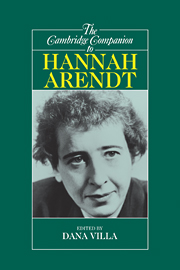Book contents
6 - Political action
its nature and advantages
from PART III - FREEDOM AND POLITICAL ACTION
Published online by Cambridge University Press: 28 May 2006
Summary
In the years since her death in 1975, Hannah Arendt's large body of work has been ever more widely discussed. So far we can say that her readers have occupied themselves mainly with two contributions that Arendt made to political theory and the study of politics. One is her analysis of the political evil of the twentieth century, especially totalitarianism in its Stalinist and Nazi forms. The other is her analysis of the excellence of politics: its greatness and the place of individual excellence in it (HC, p. 49).
Totalitarianism pressed on her with such force that she had to respond and try to be theoretically adequate to those great horrors. But she began her life as a writer with a dissertation on the concept of love in St. Augustine. One imagines that uninterrupted by political evil, she could have gone on to write philosophically about the many faces that human experience and the human condition present to the determined philosophical observer. She perhaps would have turned her attention to politics eventually, as one more type of human experience, one more way in which human beings enter into relations or confront and deal with one another. I would say, therefore, that her analysis of political excellence grows without artificiality from her original interests.
- Type
- Chapter
- Information
- The Cambridge Companion to Hannah Arendt , pp. 130 - 148Publisher: Cambridge University PressPrint publication year: 2000
- 21
- Cited by

